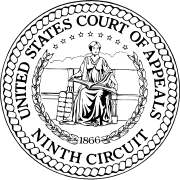Lewis Galoob Toys, Inc. v. Nintendo of America, Inc.
| Lewis Galoob Toys, Inc. v. Nintendo of America, Inc. | |
|---|---|
 | |
| Court | United States Court of Appeals for the Ninth Circuit |
| Full case name | Lewis Galoob Toys, Inc. v. Nintendo of America, Inc. |
| Decided | May 21, 1992 |
| Citation | 964 F.2d 965 |
| Case history | |
| Prior action | 780 F. Supp. 1283 (N.D. Cal. 1991) (granting judgment for Galoob following two-week bench trial) |
| Subsequent actions | cert. denied, 507 U.S. 985, 113 S. Ct. 1582, 123 L. Ed. 2d 149 (1993) |
| Court membership | |
| Judges sitting | Jerome Farris, Pamela Ann Rymer, and David V. Kenyon |
| Case opinions | |
| manufacturer of product that allowed users to alter codes transmitted between video gaming console and game cartridge did not infringe console manufacturer’s exclusive right, under federal copyright law, to create derivative works | |
Lewis Galoob Toys, Inc. v. Nintendo of America, Inc. (Ninth Circuit Court of Appeals, 1992) was a court case which established the rights of users to modify copyrighted works for their own use.
Under license from UK company Codemasters, Galoob manufactured an add-on product called Game Genie, which allowed users to modify video games by entering in certain codes; for example, a code might make the player invincible by negating the programming that updates the player's health amount. Nintendo, which sold a video game system and video games that could be modified by Game Genie, sued Galoob for copyright infringement, alleging that Game Genie made a derivative work, violating Nintendo's copyright in their video games.
The Court denied Nintendo's motion for a preliminary injunction, holding that Game Genie did not create a derivative work and also suggesting that even if it did, it might well be fair use. As the district court wrote, "Having paid Nintendo a fair return, the consumer may experiment with the product and create new variations of play, for personal enjoyment, without creating a derivative work."
An earlier appellate case on similar facts came out the other way, favoring the original copyright holder in Midway Manufacturing Co. v. Artic International, Inc.. Also, the Ninth Circuit referred to this case in Micro Star v. FormGen Inc.. In that case, Judge Kozinski concluded that the fair use analysis in Galoob v. Nintendo is "clearly dicta."[1]
Legacy
A 2002 case involving the ClearPlay technology raised a similar issue in the context of home viewing of DVDs. At no point was a copy of the DVD made; rather, offensive parts of the movie were automatically skipped. Hollywood studios and the Director's Guild of America sued ClearPlay alleging copyright infringement and trademark infringement. The case, however, was rendered irrelevant by the passage of the Family Entertainment and Copyright Act of 2005, a law that because of its narrow applicability did not abrogate Midway or affirm Galoob. (There was no judicial opinion issued in the case because it became moot in light of the new law.)
SonicBlue was sued over the commercial-skipping feature of ReplayTV on similar grounds. "Your contract when you get the show is you're going to watch the spots [advertisements]. … Any time you skip a commercial … you're actually stealing the programming," asserts Turner Broadcasting CEO Jamie Kellner. He admits that "there's a certain amount of tolerance" for going to the bathroom during commercials.[2] Due largely to the lawsuit, SonicBlue went bankrupt before the court reached a decision on the merits of the case.
References
- ^ Micro Star v. FormGen Inc., 154.F.3d 1107 (9th Cir. 1999) (opinion full text).
- ^ Hesseldahl, Arik (May 3, 2002). "SonicBlue Forced To Spy". Forbes Magazine. Archived from the original on January 9, 2004. Retrieved 2007.
{{cite news}}: Check date values in:|accessdate=(help)
External links
![]() Works related to Lewis Galoob Toys, Inc. v. Nintendo of America, Inc. at Wikisource
Works related to Lewis Galoob Toys, Inc. v. Nintendo of America, Inc. at Wikisource
